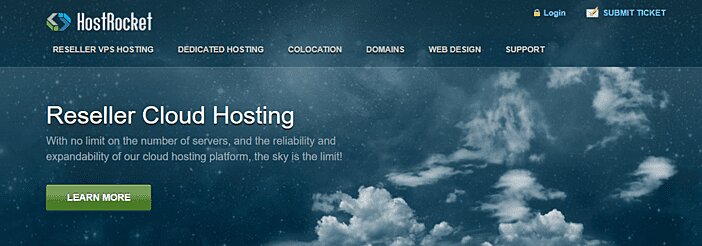Probably you’ve not seen any HostRocket review, that does it in details right?
This particular HostRocket review might be the last you will ever read before you make that buying decision.
Let me ask you this question “Have you ever felt compelled to visit a website that provides web hosting services?”
What you’ll find right away is that they’ll try to sell you on items like fantastic customer service, lightning-fast speeds, and rock-solid uptime.
Those who are not overly technical or experienced about how website hosting works will immediately see what they expect to benefit from setting up an account with such a web host based on those value propositions.
Rather, HostRocket attempts to set itself apart by attempting to sell you SSD Shared Hosting.
This HostRocket review will delve into the specifics of what this web host has to offer.
HostRocket isn’t like SiteGround, DreamHost, HostGator, or even BlueHost, which are all common web hosts.
However, this website hosting company has been operating since 1999, more than two decades, and it has its headquarters and data center in New York (Clifton Park).
HostRocket is a web hosting company based in the United States that offers shared SSD, reseller VPS, colocation, and dedicated server hosting, as well as web design services.
They currently host roughly 50,000 websites from their data centers in the United States.
To be able to give an honest HostRocket review, we at WebHost Bros decided to take a critical look at the activities, functions, and operations of this web hosting service provider before coming up with this review.
Quick Review
- 99.99% uptime guarantee
- Decent response and page load times
- Customer support available via ticket and a great knowledge base
- Dedicated hosting, WordPress hosting, SSD web hosting, and Reseller hosting.
- No free domain, $20/domain
- Unlimited bandwidth
- cPanel available
- 30-day money-back guarantee
- 250 apps integration
- Free and easy-to-use website builder
- No widows servers
- Three datacentres based in the United States and one in the Netherland
Detailed HostRocket Review
Features
HostRocket has come such a long way from its modest beginnings as a private corporation, and all without the help of venture capital, foreign investors, or bank loans.
They have placed a strong emphasis on finding a perfect balance between the quality and cost-effectiveness of their services from the beginning.
While all appears to be in order, HostRocket’s main website does not inspire much trust in its current state. Its architecture, drab color palette, and overall style, combined with a sloppy presentation of their services, make it seem outdated, uninspiring, and unfriendly to users.
Users of HostRocket can choose from 4 data centers, three of which are in the United States (New York, Chicago, and San Jose), and another of which is located somewhere within the Netherlands.
UpTime
When opposed to other service providers, this really is the aspect where the business should brag.
Missing uptime translates to fewer Web users, which may lead to lower traffic and revenues.
As a result of this, HostRocket has done an outstanding job in terms of maintaining a perfect uptime that will not let you down.
This website host was tested as usual with the assistance of a GTmetrix test. And, to our delight, the results were overwhelmingly positive.
It took just 1.3 seconds to fully load, which is much better than an average result of 8.1 seconds.
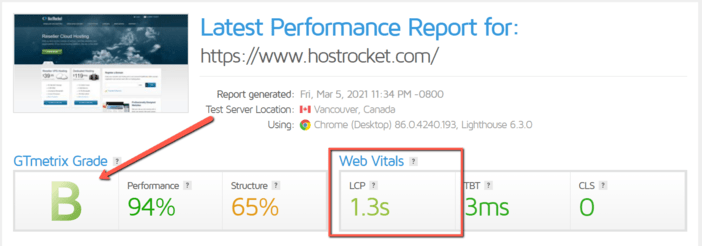
It also took 51 requests, which is quite good when compared to the national average of 89. Finally, GTmetrix determined that the website of HostRocket is deserving of a solid B.
For joint web hosting and dedicated plans, HostRocket guarantees a 99.5 percent uptime.
If the outage takes longer than the above, the company will refund your account. Customers will indeed, however, manually apply for the credits.
The company’s data center in New York State seems to have enough capacity to double.
The facility is powered by diesel generators and has a complete UPS battery backup system.
HostRocket does not have any guidance about how to backup your data regularly. Customers must back up their data using Cpanel on their own.
Apps integration
The company has added more than 250 integrated apps to support its offerings to increase sales.
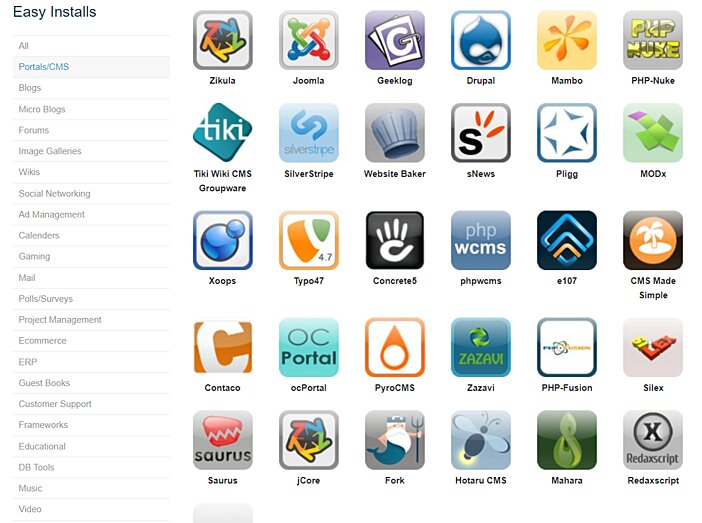
When you use HostRocket, apps like Open Cart, Drupal, WordPress, Magento, Zen Cart, and others, become part of any plan you purchase.
All of these apps are simple to install and update, and they will enable your website to achieve its maximum potential.
Pricing
As opposed to other United States or foreign services, such as BlueHost and Hostinga, HostRocket’s hosting plans are on the higher end.
Although these are SSD plans, they are still more than twice as expensive as many rivals’ shared SSD plans.
You always get a free domain, but you’ll have to pay up to $20 per year for it, and even the bandwidth and storage allowances are still very generous, making the entry-level plan comparable to many rivals’ mid-tier plans.
Shared hosting plans are available for purchase on a monthly, semi-annual, annual, or biennial basis, with longer subscriptions offering a discount.
A yearly plan, for instance, costs about 20% just under a monthly term (pro-rata), and a bi-annual plan costs 33% less than a monthly plan.
Shorter-term lengths are not only proportionally more costly but monthly and semi-annual plans often include a high additional setup cost.
If you want monthly billing, the basic shared hosting plan (without SSD) will start at $11.98 per month.
However, if you do choose an annual plan ($7.99 per month) or a biennial plan ($5.99 per month), the cost will be drastically decreased.
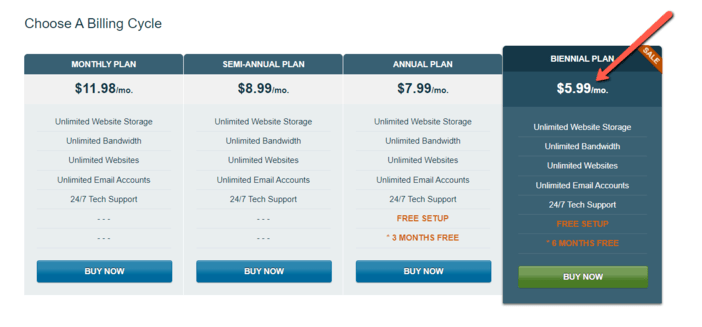
As if that’s not enough, all plans that aren’t annual have extra setup costs, which can significantly increase the cost.
Each of these plans includes bandwidth, unlimited website storage, and websites, as well as unlimited e-mail accounts, each of which looks fairly decent.
Server location
At HostRocket, you get the chance to choose where your website will be hosted by choosing from any one of their four available servers.
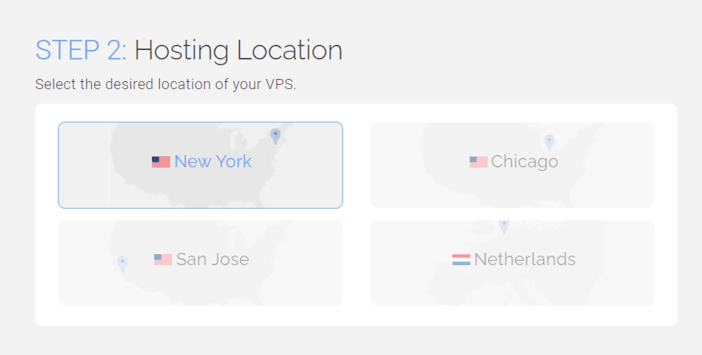
This option is particularly available on the second step of the checkout process.
Money-back guarantee
Each of HostRocket’s hosting plans comes with a 30-day money-back guarantee, so you’ll have more than enough time to decide.
Albeit not the longest within the industry, it is certainly not unheard of.
Support
Customer service is the most important after-sale service in the twenty-first century if you want to retain your customers for life.
If your customer service is lacking in some way, it could spell disaster for your company.
Customer service is available by phone or support ticket 24 hours a day, 7 days a week.
However, if you want to call anyone at HostRocket, you’ll need to be on their dedicated plan, as the shared plan doesn’t allow you to do so.
Even though working hours are 9 a.m. to 9 p.m. EST, emergency services are available at all times.
There is also a so-called “FAQ Feature,” but clicking on it will only bring you into their knowledgebase.
The knowledgebase at HostRocket is divided into ten groups, each of which contains several posts.
If you can’t find whatever you’re searching from amongst them, you can use the search box to look through the entire database.
The papers themselves are written straightforwardly and appear to be useful.
Five of them are highlighted as being the most common, and they address several key topics for beginners, such as domain registration, creating an index page with .htaccess files, uploading files to one’s website, setting up e-mail accounts, and using the control panel.
Pros
- Unlimited bandwidth
- Fast servers
- Unlimited e-mail accounts
- 24×7 phone, chat, and e-mail support
- Softaculous applications installer
- Unlimited disk space
- The cheapest plan includes a dedicated IP address and SSL certificate options
- Unlimited MySQL databases
- Checkout is fast, easy, and consumer-friendly
- cPanel control panel
- Unlimited FTP accounts
- 99.5% uptime guarantee
- A+ BBB rating
- Unlimited websites hosted
- 30 days money-back guarantee
Cons
HostRocket is relatively expensive
The lowest HostRocket plan begins at a hefty $5.99 per month.

That is still pricy, especially considering their performance so far.
Even worse, you must sign up for two years and spend in advance to take advantage of the (already) exorbitant price.
With web hosting, you should get what you pay for, just as they claim. This is true of some of the hosts we’ve tested, such as BlueHost and Siteground.
But not HostRocket so far.
Still charges setup fee
Sadly, HostRocket is among the few companies that still charge a $29.99 setup fee when you pay monthly or semi-annually.

The majority of web hosting companies will gladly set up your site for free.
They’ll also help you move your current site or offer you a free domain name for a year.
Domain name registration is expensive ($20)
I tried registering a random domain just to see how much they charge for domain registration.
And what I saw was not encouraging at all.
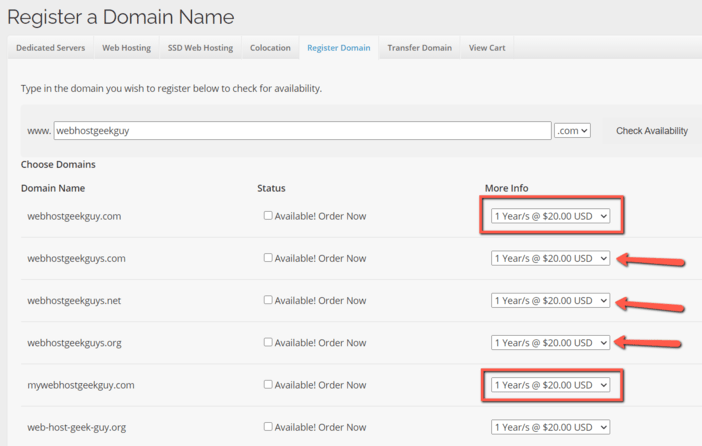
This is unlike most web hosting providers that gives you a free domain at signup.
Extra domain names cost about $20 a year, an amount you can get for half the price from other domain registrars.
FAQs
Things to Lookout Before Buying a Web Host
Among the most important things to consider is which web host to use for your website.
There are several web hosts to choose from, but the most important factor to consider is whether you will be able to monitor how your website appears on the internet.
It’s crucial to choose the best web hosting company for your business. This is the only thing that can distinguish a mediocre website from a great one.
If you’re planning to build your own website, you’ll need to find a web hosting service that can help you make this crucial decision.
You can significantly enhance and boost the efficiency of your website by choosing the right web host.
If you make the wrong decision, you’ll end up with a lot of headaches and needless expenses.
It is critical to select a website hosting service that provides sufficient flexibility to enable your business to expand without major setbacks.
There are numerous considerations to consider, some of which can be ignored even if you have completed a comprehensive budget analysis.
Website hosting plans include a plethora of features and add ons, which could be confusing at first.
1. Promise of at least 99% uptime
Here, we’ll go over the most important aspects of any hosting plan, and even what you might also anticipate from your provider during these areas.
If you’re a business website, any moment it is unavailable, it is costing you money.
Even if you’re just starting a website for fun, you risk giving visitors a bad experience and losing followers if they can’t access it every time they try.
The primary responsibility of a web hosting company should be to find ways to keep your site up and running.
Each hosting provider will need to perform routine maintenance which will end up taking your blog offline for a short period of time.
Furthermore, if servers are not properly maintained, they may heat up or break down, causing your website to be unavailable for long periods of time.
Among the most important factors in determining the reliability of a web hosting provider would be how they handle the various issues that can cause clients’ websites to go down.
The period of time a hosting provider guarantees that clients’ websites would be available is referred to as uptime in industry jargon and trusted web hosting companies frequently guarantee at least 99 percent uptime.
The best web hosting companies go sometimes further guaranteeing 99.9 percent uptime or your money back.
2. Amount of bandwidth
When searching for a hosting company, space and bandwidth are often mentioned together.
What exactly is bandwidth? This is the total amount of information your hosting will allow you and the traffic coming to your site to download and upload in a month.
Let’s say your website is 2 megabytes in size and you have a monthly bandwidth limit of 26 megabytes. You uploaded the whole site at the start of the month, and now you’ve utilized about 2MB of the bandwidth allotted to your site.
A user to your site would have downloaded 2Megabytes because they browse every section. In that month, you can have up to twelve visitors (let’s assume that each visitor views your entire site).
Afterward, your hosting company will either stop allowing visitors to your website or charge you extra per MB (this is even more probable).
Yeah sure, you’ll need to stay updated on your bandwidth, particularly if you operate a popular website or do anything that requires a lot of media (like host your own video, or high-res photos).
Most hosts, besides space, give “unmetered” bandwidth; if you feel you’ll get into the murky zone, find out the limitations, or pick a host that raises the bar high enough for all to see.
3. Technical support
This, in the majority of people’s minds, really is the most significant.
Can you try contacting and have an actual, live person on the other end of your website goes offline for some unexplained reason?
Can they either figure out what is really wrong and how to fix it or at the very least advise you on what you need to do to get the site back up and running?
Examine a host’s reputation for customer service before deciding on one.
Check out the various ways you can reach them if you need assistance – chat, email, toll-free phone, and so on.
Are they working 24 hours a day, 7 days a week? Do they hire outside help?
You’ll discover that not every host is created equal, just as not all hosts are created equal in terms of price and technological requirements.
Some companies pride themselves on their support staff, while others consider customer service to be an optional extra. Stay away from the latter.
After you select a good web host provider, you should be able to get technical support for your website so it doesn’t crash due to technical difficulties.
The best option is to go with a web hosting provider that has the most technological experience. They should have experienced experts in all technical aspects of website creation on staff.
4. Ability to scale
Scalability is essential for two reasons: first, the website must be able to manage large spikes of visitor numbers.
Second, you’ll need a hosting company for which you can organically expand your business and, as a result, your web traffic grows.
Consider how convenient it would be to switch if you ever need to while selecting a hosting service.
When your website’s traffic hits a certain amount, will your hosting provider upgrade you from an entry-level shared hosting to an advanced VPS without even any interruption?
Your website’s online traffic may fluctuate seasonally. This must be assisted seamlessly.
In December, for instance, a Christmas tree vendor is expected to see a significant increase in website traffic.
A hosting provider’s scalability would allow the website to manage traffic spikes without crashing.
It’s critical that your website can accommodate growth and any sudden increases in visitor numbers.
Make sure you select a host that allows you to upgrade to a VPS.
5. Backups and monitoring
Using a web host that backs up clients’ websites on a comprehensive and systematic basis gives you invaluable peace of mind, as you can focus on running your business instead of worrying that it could all be lost forever at any time.
Take into account how often your hosting company performs backups and also how long it will take to recover a site from a backup.
This service is normally not included in uncontrolled plans, although it might be available at a price.
Another important factor to remember is monitoring.
Monitoring your site and server regularly will help you avoid problems later on.
Again, controlled hosting plans are mostly responsible for this.
Hacking, fire in the data center, human error, and component failure are all reasons why you would need a backup of your website.
You can also save your files to a third-party service (such as Google Drive) or locally on your device.
6. Look at the signup and renewal price
For web hosts, there are two separate prices to be aware of: the signup price and the renewal price.
In several cases, the price you pay when you sign up for a contract will not be the same when you renew it.
The renewal price will almost always be slightly higher, based on the amount of offers/discounts you got.
Regrettably, it’s a usual feature for hosting providers to raise renewal prices, and there’s no way to stop it unless you plan to switch your web host after 2 to 3 years.
Alternatively, look for web hosts that have fair price increases (nothing above 100 percent).
If the signup fee was $5 per month, the renewal fee should not exceed $10 per month.
If you’re new to the game, here is another fast tip:
Often check the web host’s terms of service for its renewal policy.
Their TOS is typically found on the website, and a simple keyword query (renew or renewal) could even bring it up.
7. Secure Socket Layer (SSL) Encryption
This is a must-have for anyone planning to host an eCommerce website because it ensures that your shoppers’ financial and personal information is kept safe during and after any purchases they make on your site.
SSL establishes a safe, encrypted link between the web server of the hosting provider and the browser of the site user (i.e. Google Chrome).
This stops cybercriminals from ‘skimming’ or gathering confidential information during the buying process.
The increased value of visitor confidence that comes with SSL Encryption will help almost all websites.
8. Provision of domain name management
Website hosting is among the essential components of any website, as is a domain name.
Selecting and registering a domain is amongst the most critical steps in launching a new site.
It’s also vital to keep your domain names updated for the duration of your website.
Even though it’s feasible to register your domain with a separate service than your web hosting company, keeping everything in one location would make it far easier to remain on track of domain management.
Check with your web hosting company to see how you can handle your domain registrations and renewals using the same platform you use to manage your web hosting.
Since you are expected to include your identity and address as well as agree to such information is available online, registering a domain may raise some privacy issues.
If you’re concerned about this, you can pay more money for Domain Name Privacy.
Instead of your name, the Domain will show the identity of the company that provides the privacy service.
Although there would be an additional cost, for many, this is well worth it.
9. Server location
The nearer a data center is to visitors, the quicker your website can load. Pick a good hosting provider with a data center close by if you expect all of your visitors to come from the same location.
Sometimes if that isn’t the situation, you can still purchase a web hosting package with a CDN plan (Content Delivery Network).
When your site is viewed via a region, a CDN can store a duplicate of the page as well as the static content.
Website visitors will still get information from the server nearest to their place, which is known as caching.
10. Solid State Drives (SSD)
While SSDs are more costly than regular HDDs, it’s for a valid reason: they are far quicker, most efficient, and use lesser power than conventional spinning disk drives.
SSDs don’t have any moving components so they’re dependable, quiet, and a long-lasting and energy-efficient digital storage choice.
Hard disk drives are likely to stay widely known for a considerable time, particularly in the value segment of the market, where “free” and “unlimited” still reign supreme.
11. Is site migration supported?
The goal is to choose the best web hosting service from the start, however, not everybody lives up to that expectation.
If you’re looking for web hosting options because you’re unhappy with your existing provider you’ll want to find one that can assist you with the task of moving your website.
Discuss how the migration procedure works. Consider speaking with a help person there for more information so you know exactly what you’re getting yourself into.
If they would make the transition as painless as possible, you’ll be able to able to transfer over easily and get back to doing what you do best: running your website.
12. Free AdWords
Although it isn’t something you’ll actually require, it is something you’ll most likely want to take full advantage of.
Most service providers give Google AdWords credit, typically about $50, or some other type of advertisement, which I’ve noticed.
Even though you’d like to use a different advertising proxy, free can’t be matched, so go ahead and use it!
13. High-quality training
Even though the general look is easy, you’re probably going to have concerns about how to use some features on your website.
Examine the types of tools available from your web hosting company to assist you in learning how to use their services prior to actually making a decision.
They ought to have a lot of resources, such as videos and also how-to guides.
What is even better is getting an effective support network where you’ll get answers to your concerns from other customers of the web hosting provider.
Check to see whether the organization, in conjunction with their other support services and customer service department, does have an interactive forum.
This is key since you should never have to depend on their customer service team to solve all of your complaints.
14. Budget
Another important factor to consider is your budget. Many businesses will try to get the best price from the host for their website and this can end up costing them dearly.
The website needs to be tailored specifically to what you are trying to offer your prospects, customers, individuals, or customers.
The website will need to be optimized, cleaned up, updated, etc.
This is the main reason why you have to be sure you know the costs associated with your website.
It is also important, if you are on a tight budget, to be sure that you understand how to build your website.
This is also going to determine whether you are going to find yourself paying more than you needed to for your hosting service.
You have to be as clear as you can about the process of building up your website.
Conclusion
It is our believe here at WebHost Bros that this HostRocket Review has been able to reveal what you stand to gain should you go with this hosting provider.
However, one thing to keep in mind is that HostRocket is a fairly standard hosting website.
Here’s what you get when you compare their results to their hard costs:
- Their assistance is adequate, but not exceptional.
- Their uptime is clearly insufficient.
However, their pace has improved.
Customers benefit from a higher level of timely, attentive service due to their reduced size and internal datacenter.
In comparison to the high cost and extra setup charge, HostRocket’s “value” is too ordinary.
You’d be better off using a different host.
